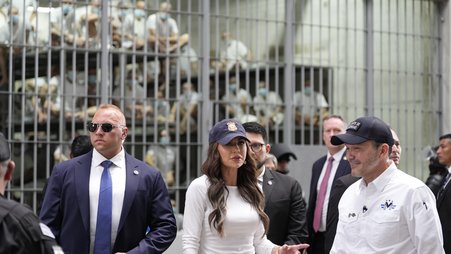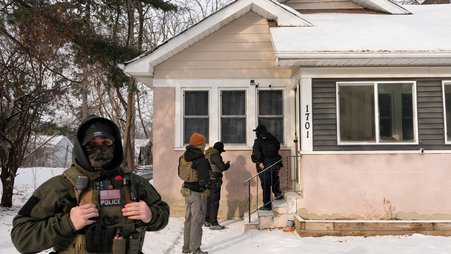Today, Freedom of the Press Foundation is publishing the full, previously unreleased audio recording of Private First Class Bradley Manning’s speech to the military court in Ft. Meade about his motivations for leaking over 700,000 government documents to WikiLeaks. In addition, we have published highlights from Manning’s statement to the court.
While unofficial transcripts of this statement are available, this marks the first time the American public has heard the actual voice of Manning.
Bradley Manning's Full Statement
Download
- full_statement.mp3 (63M)
- full_statement.ogg (37M)
See Help Spread Bradley Manning's Words Across the Internet to embed the full audio, as well as excerpts from the audio, on your website.
He explains to the military court in his own cadence and words how and why he gave the Apache helicopter video, Afghanistan and Iraq Wars Logs, and the State Department Diplomatic Cables to WikiLeaks. Manning explains his motives, noting how he believed the documents showed deep wrongdoing by the government and how he hoped that the release would "spark a domestic debate on the role of the military and our foreign policy in general as it related to Iraq and Afghanistan." In conjunction with the statement, Private First Class Manning also pleaded guilty to 10 of the 22 charges against him.
Freedom of the Press Foundation is dedicated to supporting journalism that combats overreaching government secrecy. We have been disturbed that Manning’s pre-trial hearings have been hampered by the kind of extreme government secrecy that his releases to WikiLeaks were intended to protest. While reporters are allowed in the courtroom, no audio or visual recordings are permitted by the judge, no transcripts of the proceedings or any motions by the prosecution have been released, and lengthy court orders read on the stand by the judge have not been published for public review.
A short film by Laura Poitras
A group of journalists, represented by the Center for Constitutional Rights (CCR), has been engaged in a legal battle to force the court to be more open. While the government has belatedly released a small portion of documents related to the case, many of the most important orders have been withheld—such as the orders relating to the speedy trial proceedings or the order related to Manning’s prolonged solitary confinement.
Michael Ratner, president emeritus of CCR, called the government "utterly unresponsive to what is a core First Amendment principle." Ratner noted this is a public trial, the information being presented is not classified, and that contemporaneous access to information about the trial is necessary to understanding the proceedings. Nonetheless, the lawsuit has been tied up in the appeals court for months.
Freedom of the Press Foundation’s mission is to support and defend cutting-edge transparency journalism by supporting those organizations that publish leaks in the public interest. We often report on news surrounding government secrecy, educating the public about the important relationship between leaking and independent journalism. When we received this recording, we realized we had a unique opportunity to bring some small measure of transparency directly by allowing the world to hear for itself the voice of someone who took a controversial and important stance for government transparency.
We hope this recording will shed light on one of the most secret court trials in recent history, in which the government is putting on trial a concerned government employee whose only stated goal was to bring attention to what he viewed as serious governmental misconduct and criminal activity. We hope to prompt additional analysis of these proceedings by other journalistic institutions and the public at large. While we are not equipped (technically or as a matter of human resources) to receive leaked information nor do we plan on receiving them in the future, we are proud to publish and analyze this particular recording because it is so clearly matches our mission of supporting transparency journalism.
The information provided by Manning has uncovered stories of wrongdoing by the United States, as well as by leaders and politicians around the world. The cables were reportedly one of the catalysts that led to the Arab Spring and sped up the end of the Iraq War. To this day, more than two years after their release, the information provided by Manning is used every day by journalists and historians in major publications are the world to enlighten and inform the public, both in the United States and around the world. In a time when the extent and reach of U.S. government secrecy is unprecedented, and there are credible reports that the government has abused its secrecy and classification systems to cover up numerous illegal and unconstitutional activities, Manning’s actions should be seen as an overdue sliver of sunlight into an overly secret system rather than as a basis for a prosecution seeking decades of imprisonment.
By releasing this audio recording, we wish to make sure that the voice of this generation's most prolific whistleblower can be heard—literally—by the world.
Regardless of whether one believes that Manning’s acts were right or wrong or a mix of both, he has taken responsibility for them by pleading guilty to ten charges, for which he faces up to twenty years in prison. The government however, is continuing to pursue all of the charges against him, including charges under the Espionage Act and "aiding the enemy" —which could have huge consequences for press freedom and the First Amendment. The ACLU has expressed concern that this "aiding the enemy" charge could criminalize speech for all sorts of active military members, noting that "In its zeal to throw the book at Manning, the government has so overreached that its ‘success’ would turn thousands of loyal soldiers into criminals."
And Harvard Law professor Yochai Benkler has argued that this prosecution could decimate national security journalism by outlawing whole categories of journalist-source relationships in the future: "[T]he prosecutors seem bent on using this case to push a novel and aggressive interpretation of the law that would arm the government with a much bigger stick to prosecute vaguely-defined national security leaks, a big stick that could threaten not just members of the military, but civilians too."
Extreme secrecy in our courts, just like in our government’s policies and our politics, is an anathema to democracy. Whether military or civilian, this type of closed-door legal process impairs the public’s right-to-know and journalists’ ability to report on matters of deep public concern. The courtrooms of America should be open to the public, so they can see and hear what is being done in their name.
You can donate to aggressive journalism outlets dedicated to transparency and accountability on our homepage. You can learn more about Bradley Manning’s case by visiting the Bradley Manning Support Network.




